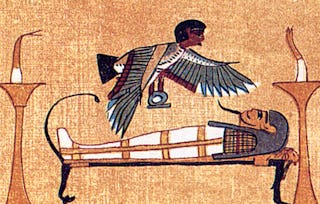Throughout history, the vast majority of people around the globe have believed they have, however defined, a “soul.” While the question of whether the soul exists cannot be answered by science, what we can study are the causes and consequences of various beliefs about the soul and its prospects of surviving the death of the body. Why are soul and afterlife beliefs so common in human history? Are there adaptive advantages to assuming souls exist? Are there brain structures that have been shaped by environmental pressures that provide the foundation of body/mind dualism that is such a prominent feature of many religions? How do these beliefs shape the worldviews of different cultures and our collective lives? What is the role of competing afterlife beliefs in religion, science, politics, and war? This course explores several facets of this relatively unexplored but profoundly important aspect of human thought and behavior.

Soul Beliefs: Causes and Consequences - Unit 2: Belief Systems
Ends soon: Gain next-level skills with Coursera Plus for $199 (regularly $399). Save now.

Soul Beliefs: Causes and Consequences - Unit 2: Belief Systems


Instructors: Prof. Daniel M. Ogilvie
17,572 already enrolled
Included with
(172 reviews)
Skills you'll gain
Details to know

Add to your LinkedIn profile
See how employees at top companies are mastering in-demand skills

There are 12 modules in this course
What's included
1 video2 readings
What's included
3 videos1 reading
What's included
3 videos1 reading1 assignment
What's included
3 videos2 readings
What's included
3 videos2 readings1 assignment1 peer review
What's included
3 videos
What's included
3 videos1 reading1 assignment
What's included
1 video
What's included
3 videos1 reading
What's included
3 videos1 assignment1 peer review
What's included
3 videos1 reading
What's included
2 readings
Instructors


Explore more from History
 Status: Preview
Status: PreviewRutgers the State University of New Jersey
 Status: Preview
Status: PreviewRutgers the State University of New Jersey
 Status: Preview
Status: PreviewThe University of Edinburgh
 Status: Preview
Status: PreviewThe University of Edinburgh
Why people choose Coursera for their career




Learner reviews
172 reviews
- 5 stars
77.77%
- 4 stars
14.03%
- 3 stars
4.09%
- 2 stars
1.16%
- 1 star
2.92%
Showing 3 of 172
Reviewed on Nov 1, 2023
Highly enjoyable with a splendid team and multi-disciplinary approach. Warning, not a course for the.narrow-minded.
Reviewed on Dec 22, 2016
Thoughtful, multi-disciplinary course.. Bravo for the effort.
Reviewed on Jun 21, 2016
An excellent presentation. Guest lecturers outstanding. Forces a person to really question beliefs rather than accepting at face value. Excellent points raised by learned professionals.

Open new doors with Coursera Plus
Unlimited access to 10,000+ world-class courses, hands-on projects, and job-ready certificate programs - all included in your subscription
Advance your career with an online degree
Earn a degree from world-class universities - 100% online
Join over 3,400 global companies that choose Coursera for Business
Upskill your employees to excel in the digital economy
Frequently asked questions
To access the course materials, assignments and to earn a Certificate, you will need to purchase the Certificate experience when you enroll in a course. You can try a Free Trial instead, or apply for Financial Aid. The course may offer 'Full Course, No Certificate' instead. This option lets you see all course materials, submit required assessments, and get a final grade. This also means that you will not be able to purchase a Certificate experience.
When you purchase a Certificate you get access to all course materials, including graded assignments. Upon completing the course, your electronic Certificate will be added to your Accomplishments page - from there, you can print your Certificate or add it to your LinkedIn profile.
Yes. In select learning programs, you can apply for financial aid or a scholarship if you can’t afford the enrollment fee. If fin aid or scholarship is available for your learning program selection, you’ll find a link to apply on the description page.
More questions
Financial aid available,
¹ Some assignments in this course are AI-graded. For these assignments, your data will be used in accordance with Coursera's Privacy Notice.

